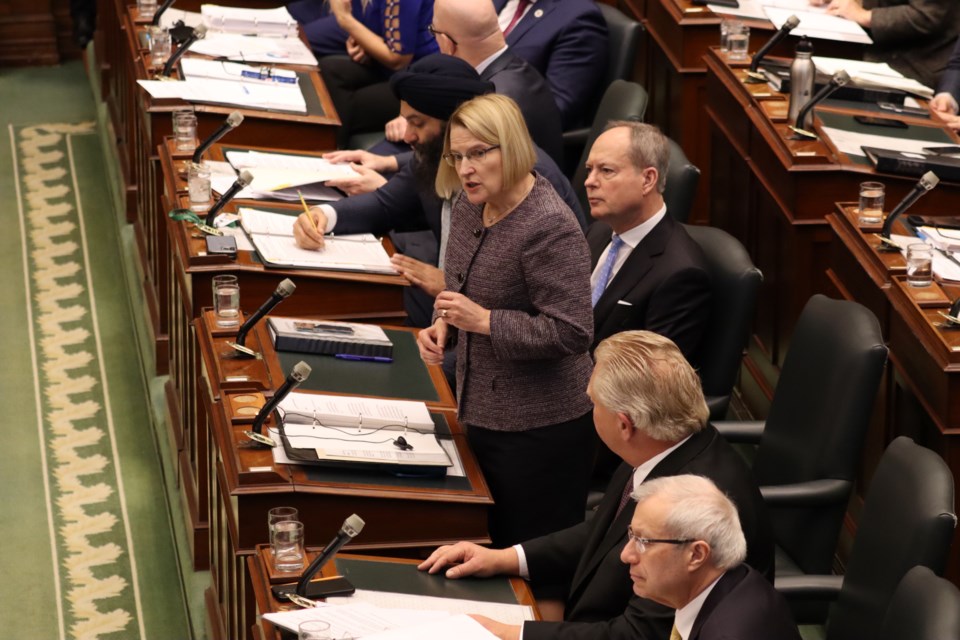This article originally appeared on The Trillium, a Village Media website devoted exclusively to covering provincial politics at Queen’s Park.
Three Ontario cities have been waiting a year or more for the province to approve their applications for consumption and treatment services sites — a delay Ontario's health minister is blaming on the pandemic.
In Barrie, there were 60 opioid toxicity deaths in 2022 as the region waited for Ontario's Ministry of Health to process its application.
The region's efforts to get a supervised consumption site began in January of 2018 and its application for a provincially funded consumption and treatment site has been with the Ministry of Health since Oct. 7, 2021 — over a year and a half. There were 74 toxic opioid deaths that year.
Cathy Eisener, a local public health nurse, says she doesn't think the site would have saved everyone who has died as the city waits.
"But it would have made a difference," she told The Trillium in a recent interview.
At a recent committee meeting at Queen's Park, NDP health critic France Gélinas asked the health minister about the delay in approving a site in Sudbury, which has also been waiting over a year and a half for approval.
"So, as a member opposite knows, there also was a pandemic when that application was submitted to the ministry," Sylvia Jones replied. " And there was a clear and obvious need to focus on everything we needed to protect the people of Ontario and ultimately, of course, offering and expanding the use of vaccines as they became available."
When The Trillium relayed that exchange to Eisener, the Barrie public health nurse, her reaction was, "Wow."
From a public health perspective, Eisener added, there was a recognition that toxic opioid deaths were trending upward during COVID and she, personally, was switched back from COVID work to harm reduction in July 2020.
"So, I'm surprised by that statement, that it was delayed because of COVID. I think that's all I can say about that."
In Sudbury, the opioid crisis also worsened during the pandemic, said Dr. Penny Sutcliffe, the medical officer of health for Public Health Sudbury & Districts.
"Certainly, the pandemic has been preoccupying for all of us — not only in the health sector, but you know, broadly speaking," she said, but added that "harm reduction is not unimportant."
"I would say that being able to prevent deaths through supervised consumption is a critical component of a comprehensive strategy to really try to get a grip on this issue."
The third city with a pending application for a provincially funded consumption and treatment services site is Windsor, which submitted its application to the province in July 2022. According to Eisener and Sutcliffe, the ministry has not required additional information from their communities during the wait. They have been simply waiting.
Both Windsor and Sudbury have moved forward with opening supervised consumption sites in the location where they've applied for provincial funding. Health Canada has granted them exemptions from federal drug laws to do so and they've secured local funding.
That wasn't possible in Barrie, said Eisener.
Sutcliffe said the City of Greater Sudbury has committed the funding — just over $1 million, annualized — to continue the site through the calendar year, but after that, its future is uncertain.
"This is not going to be the panacea," she said. "This is not going to solve all our problems in Sudbury or across Ontario. But it is important, and it's an important aspect, certainly to prevent deaths, and for the Ontario model to help to transition people to treatment if they are ready to take that path."
Eisener said that, once the Barrie site is open, she expects it to help reduce the burden on local hospitals, which get frequent emergency visits from people who have overdosed, and to help people who use drugs connect with the health and social supports they need.
At the committee meeting, associate deputy minister of public health Elizabeth Walker said there are two more applications with the ministry that are not fully complete, but did not identify what communities they are for, and said she had no timeline for when the outstanding applications will be approved, or denied, but would continue to work with the government on the issue.
The province has 17 funded consumption and treatment services sites and said it will cap the number at 21, which would not allow all of the five pending sites to be approved.
Walker noted that other communities have expressed interest as well.
The province announced the framework for supervised consumption and treatment services sites in 2019 after Doug Ford said during his first campaign that he was "dead against" the sites, which the PCs later walked back. After they won the election and formed government, then-health minister Christine Elliott launched a review of the evidence to support the sites and ultimately gave the green light to most of the existing supervised injection sites in the province — approving provincial funding for 15 that met criteria she set out for the newly rebranded consumption and treatment services sites.
The most recently approved provincially funded CTS site is in Peterborough. According to a local news website, that site was waiting for the minister's approval for months after it had been approved by the bureaucracy. Peterborough Currents reported on emails obtained through a freedom of information request that suggest the site had been approved by the deputy minister of health in June of 2021 and the chief medical officer of health asked for the approval to be expedited the following month, but funding was not announced until February of 2022. It opened the following June.
Today, another half dozen supervised consumption sites operate in the province without provincial funding, but with federal government exemptions from drug laws.



